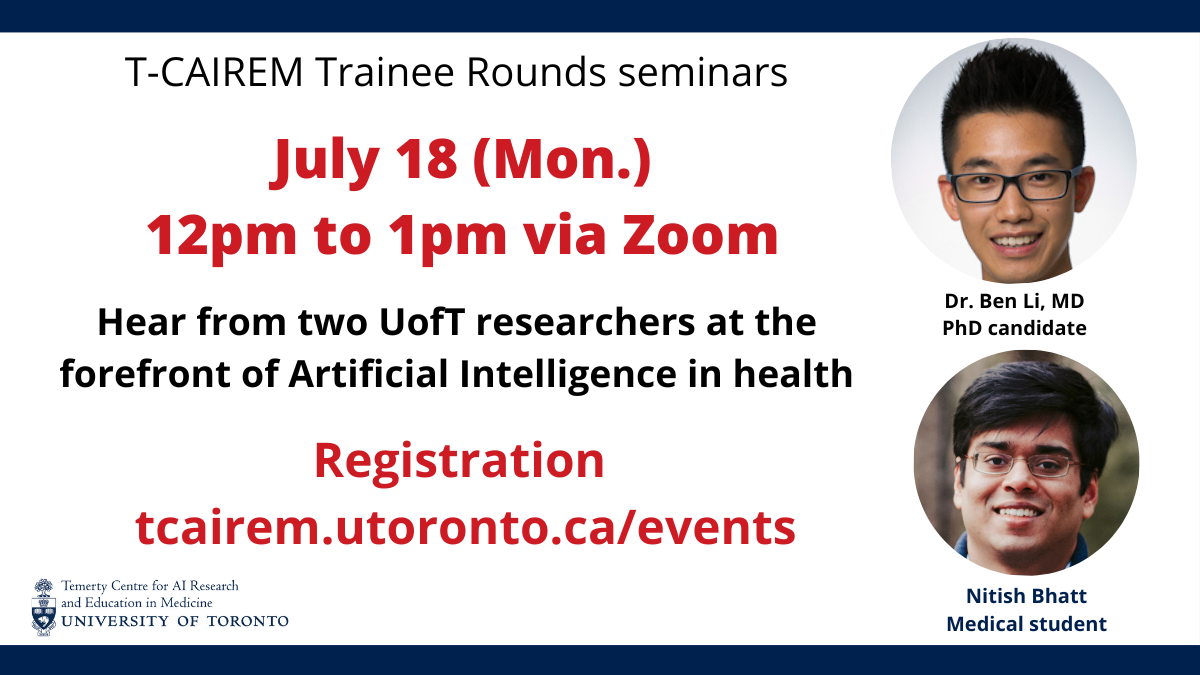Main Second Level Navigation
Trainee Rounds: Ben Li and Nitish Bhatt
DATE: July 18, 2022 (Monday)
TIME: 12pm to 1pm EST
METHOD: Zoom
PRESENTERS: Dr. Ben Li and Nitish Bhatt
REGISTRATION: https://us06web.zoom.us/meeting/register/tZwrf-CqqTooHtdcTNZIAKczJp8VVl7ca1Bs
Dr. Ben Li, MD
PGY2 Vascular Surgery, PhD Candidate, Institute of Medical Science, University of Toronto
Title of Talk
Machine learning in vascular surgery: a systematic review and critical appraisal
Abstract
Machine learning (ML) is a rapidly advancing field with increasing utility in health care. We conducted a systematic review and critical appraisal of ML applications in vascular surgery. MEDLINE, Embase, and Cochrane CENTRAL were searched from inception to March 1, 2021. Study screening, data extraction, and quality assessment were performed by two independent reviewers, with a third author resolving discrepancies. All original studies reporting ML applications in vascular surgery were included. Publication trends, disease conditions, methodologies, and outcomes were summarized. Critical appraisal was conducted using the PROBAST risk-of-bias and TRIPOD reporting adherence tools. This talk will summarize our findings.
Biography
Ben Li is a vascular surgery resident and PhD candidate at the University of Toronto. His thesis focuses on using machine learning to predict outcomes following major vascular surgery. He works collaboratively with data scientists, researchers, and clinicians to apply machine learning techniques to health care with the goal of improving patient care. Ben is excited to share his work with you.
Learn more
• LinkedIn
• ResearchGate
Nitish Bhatt
Medical Student, Temerty Faculty of Medicine, University of Toronto
Title of Talk
Using Deep Convolutional Neural Networks to Automate Detection of Plaques in Carotid Ultrasound
Abstract
Stroke is a devastating consequence of plaque rupture from the carotid arteries. Currently, management of known carotid plaques can involve waiting for symptoms (e.g., stroke or mini-stroke), since intervention itself has risk of stroke and not all plaques are vulnerable to rupture. There is a need to better risk-stratify plaque that causes stroke. Carotid ultrasound is a non-invasive and inexpensive visualization of plaques but is limited by human interpretation. We hypothesize that identifying high risk carotid plaque features in carotid ultrasound, using deep learning, can improve risk stratification.
Biography
Mr. Bhatt is entering second year of medical school at the University of Toronto. He previously completed his undergraduate studies in Systems Design Engineering at the University of Waterloo. He is very interested in and eager to explore applications of AI to medical imaging.
Learn more
